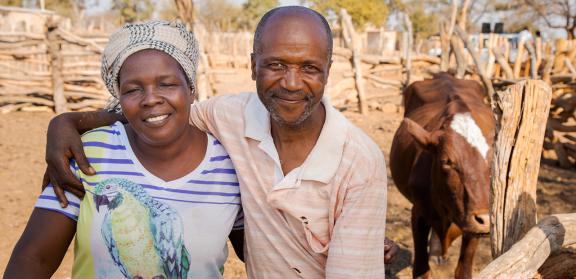
Gender Equality is Fundamental to Good Nutrition
Gender equality and good nutrition go hand-in-hand. Women’s nutritional status affects not only their own health but the health of their children and families. Yet vulnerable women—especially female-headed households—are less likely to have control and access to income and resources, opportunities for education and training, and leadership roles in the community. Increasing women’s empowerment and working towards gender equality is one pathway to improving women’s nutrition and the well-being of their families.
USAID Advancing Nutrition recognizes an important need to understand and take into account how gender affects agricultural outputs, healthy diets, and nutritional status. A key aspect of our social and behavior change approach includes unpacking and responding to the social and gender norms that influence nutrition.
Our Gender Equality Strategy
To integrate gender into our work, USAID Advancing Nutrition developed a gender equality strategy that aims to empower women and thoughtfully engage fathers and other family members to improve women and children’s health and nutrition. We consider gender at each step of the program cycle, from design to evaluation and sharing lessons learned. For example, we identify potential gender-based constraints or opportunities and address them in activity design and implementation. When relevant to the situation and context, USAID Advancing Nutrition aims for gender-transformative programming to shift cultural and social norms and structures towards gender equality.
Gender Training for Nutrition Programs
If you’re looking to conduct a gender training for staff on a nutrition program or activity, check out our interactive training package. The package is intended to be adapted to a wide range of program needs and includes considerations for both nutrition-specific and nutrition-sensitive interventions and programs. After the training, participants will be able to—
- Identify key gender concepts, including the gender integration continuum.
- Describe why gender analysis is important to our work and to us as individuals.
- Explain how to conduct a gender analysis.
- Complete a gender integration action plan.
Our Progress
We’re continuously learning about how to best integrate gender into our project activities and adapt when needed. This Gender Integration in Nutrition Program Guide compiles the resources we developed over the project, and provides real examples. Our gender integration infographic highlights progress we made in the project’s second year (September 2019 to August 2020), such as educating our own staff on gender equity and developing certain tools to support gender integration.
We’re also exploring how to engage other family members, like fathers and grandmothers, to improve mothers’ and children’s nutrition. Mothers are typically the primary caregivers in the family given cultural gender roles and responsibilities. However, they are disproportionately more likely to be overworked, have less autonomy, and have limited access to income and resources. Part of our gender-transformative approach includes encouraging the participation of other family members and community members with optimal women’s nutrition and child care and feeding. This approach includes identifying and preventing potential unintended consequences from engaging family members in tasks traditionally led by women. See our program guidance on engaging family members and our recent webinar on the same topic. The Gender Integration in Nutrition Program Guide includes a normative theory of change on family engagement in nutrition. Use this theory of change to consider the drivers, strategies, and possible pathways to measure whether working at the community, service, market, or policy levels, because gender, age, and power dynamics within the family can directly shape and influence nutrition outcomes.